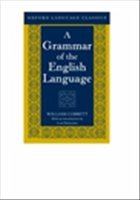William Cobbett (1763-1835), author of Rural Rides, is (in the words of G. K. Chesterton) 'the noblest English example of the noble calling of the agitator'. A champion of the poor who had taught himself to read and write, his radicalism brought him into conflict with the authorities on many occasions, but he reserved a special kind of venom for politicians like Lord Castlereagh and the Duke of Wellington, for men of letters like Dr Johnson, the lexicographer, and for Fellows of English Colleges, 'who live by the sweat of other people's brows'. He takes all of these to task in his Grammar for their poor command of English, which was (he says) no better than that of chambermaids, hucksters, and plough-boys. Written in the form of letters to his fourteen-year-old son, James, the Grammar is the most colourful and entertaining treatment of the subject ever published - plebeian, prejudiced, and richly illustrated with examples from the language of the countryside. The text is that of the 1823 edition, which includes Six Lessons 'intended to prevent Statesmen from using false grammar'. A new introduction by Lord Hattersley gives a modern perspective on the book and confirms its interest and importance to the modern reader as they were of influence in their own time.
First published in 1818 in New York and in 1819 in London, this book caused conflict at the time amongst authorities. It consists of a series of letters and six lessons, 'intended to prevent Statesman from using false grammar, and writing in an awkward manner'. The letters, written to his teenage son, are richly illustrated with examples from the countryside.
First published in 1818 in New York and in 1819 in London, this book caused conflict at the time amongst authorities. It consists of a series of letters and six lessons, 'intended to prevent Statesman from using false grammar, and writing in an awkward manner'. The letters, written to his teenage son, are richly illustrated with examples from the countryside.
